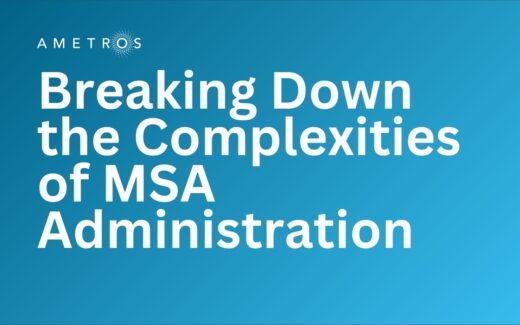A Workers’ Compensation Medicare Set-Aside Arrangement (WCMSA) is a financial agreement in which a portion of a workers’ compensation settlement is set aside to cover future medical expenses related to a work-related injury that would normally be paid by Medicare. These funds are reserved to prevent the cost from being shifted to Medicare.
However, many injured workers do not fully understand the responsibilities outlined by the WCMSA Reference Guide v. 4.3 and Self-Administration Toolkit v 1.7. While it is the responsibility of the injured worker’s attorney to explain the rules of self-administration, the process can be time consuming and difficult for injured workers to fully comprehend. This article outlines the self-administration responsibilities of injured workers, highlights common pitfalls, and explores the advantages of professional administration. Our goal is to simplify the process and provide peace of mind for the beneficiary.
Submitting a WCMSA to The Centers for Medicare and Medicaid Services (CMS) is a voluntary process, However, it requires the beneficiary’s signed consent and authorization for the Medicare Set Aside (MSA) vendor to submit the proposal on their behalf. The CMS Reference Guide further outlines the required “Consent to Release” form, which may include language indicating that the beneficiary has reviewed the submission package and understands the intent of the WCMSA, the submission process, and the related administration requirements. The injured worker’s attorney should also help explain the purpose of the MSA and the responsibilities of administration, even in cases involving non-submitted MSAs. According to CMS guidelines, WCMSAs should be administered by a competent administrator. While beneficiaries are permitted to self-administer their funds, CMS “highly recommends” the use of a professional administrator to manage and administer an MSA. See Workers' Compensation Medicare Set-Aside (WCMSA) Arrangement Reference Guide, v4.3, Sec. 17.1.
What are the Administrative Responsibilities of a WCMSA:
Setting Up the WCMSA Bank Account
- An injured worker must deposit your WCMSA settlement funds in their own account, separate from any other accounts they may have. The funds from this account can ONLY be used to pay for future medical treatment and prescription costs related to the injury and otherwise covered by Medicare.
- It must be an account that earns interest and should be insured by the Federal Deposit Insurance Corporation (FDIC). Medicare also recommends an account that does not charge fees when there is a low balance, and checks can easily be written.
- One of the key challenges in managing an MSA is that some individuals do not have an established bank account. Without setting up a separate account for the MSA funds, there is a risk that Medicare may deny coverage once those funds are exhausted.
- Ametros can help simplify this process by establishing the MSA funds in a separate, interest-bearing account that is FDIC insured and set up in the injured workers’ name and social security number.
Notifying Your Health Care Providers and Pharmacy
- Advise the medical providers of your MSA and have them bill you direct or if you have professional administrator to bill them for review and payment.
- You will need to advise the doctor to only bill you for work related treatment otherwise covered by Medicare. You should have the doctor bill your non-work-related treatment directly to Medicare.
- CMS also requires the beneficiary to notify their MedAdvantage and Prescription Drug Plan of the MSA. Please keep in mind changing to a new plan, requires notification to that new plan. Failure to properly report can lead to conditional payments, delays in treatment, and possible denial of coverage.
- Coordinating healthcare can be complex, especially when multiple providers are involved. Ametros is here to support you by notifying and coordinating with your medical providers and pharmacy on your behalf. Catastrophic claims often require additional time and specialized expertise to ensure a proper transfer of care after settlement. Our team, including durable medical equipment specialists, pharmacy experts, and government benefits professionals, is here to guide you through every step of the way.
Reviewing Medical Bills
- When injured workers self-pay for medical expenses without access to provider discounts, they risk prematurely exhausting their MSA funds, which can lead to out-of-pocket costs such as co-pays and deductibles. Additional concerns include medical billing errors, overcharges, and the improper inclusion of non-work-related conditions.
- Medicare has warned that even honest mistakes in managing MSA funds can result in denial of future Medicare coverage. This is why professional administration with Ametros is so beneficial. Our team of medical billing experts review all medical charges in order to obtain the best possible rate to help preserve MSA funds and help ensure they last throughout the beneficiary’s lifetime.
Maintaining Records and Annual Attestation
- Injured workers will need to keep clear and accurate records of every expense with the MSA account. Medicare will use these records to determine if the account funds were spent properly.
- CMS recommends that you record your settlement date, diagnosis or injury, date of injury and other transactional data from the medical billing.
- Keep an itemized receipt or other proof of each payment made. Also, keep bank statements and tax records to show proof you have properly accounted for the funds.
- What is an Annual Attestation? - An attestation is a signed statement that the injured worker has appropriately used the MSA funds. Every year, no later than 30 days after the anniversary date of the workers’ compensation settlement, injured workers must send an attestation to Medicare’s Benefits Coordination & Recovery Center (BCRC) stating they used the funds in the account correctly.
- Attestations can either be mailed or beneficiaries can access the WCMSA Portal via Medicare.gov to submit the attestation electronically.
- A professional administrator like Ametros simplifies the MSA accounting, and files annual attestation and exhaustion letters to ensure compliance and continued care.
Making sure you notify the plans if the WCMSA funds are Depleted
- If an injured worker runs out of MSA funds, they will need to file either a permanent exhaustion letter if the MSA was funded with a lump sum, or a temporary depletion letter if the MSA was funded with an annuity. The injured worker should also have their prior annual attestation filings. The injured worker will also need to coordinate with their medical providers to bill Medicare. If the injured worker is enrolled in a MedAdvantage and/or a Prescription Drug Plan, they will need to coordinate and advise those plans that the MSA funds have been depleted. If the depletion is temporary, the MSA can be once again used once the next deposit from the structured settlement is received
- Medicare and Non-Medicare services: For an extensive list of services covered and not covered by Medicare, get a copy of the booklet “Medicare & You” from your local Social Security office, or download the handbook here.
- MedAdvantage and Prescription Drug Plans. You must tell your insurance plan sponsor any details concerning treatments and medications used exclusively to treat a related illness or injury, so they can avoid making primary payment in the future. Failure to do this will result in the injured workers' coverage getting delayed or cancelled.
Whether an injured worker chooses to self-administer their Medicare Set-Aside or opts for the CMS recommended method of professional administration, our goal is to ensure they make an informed decision and are fully prepared for the responsibilities that come with post-settlement care.
Ametros is the largest and most trusted partner for professional administration with over 30,000 members. We make healthcare easier for our members and are ready with a team of experts to answer your questions.
Before you decide to self-administer your MSA, take this short knowledge quiz to see if you’re truly prepared. It may help you reconsider whether professional administration is the right choice for you.
- True or False: Do MSA’s cover all work-related treatment?
Answer: False. MSAs should only cover Medicare-covered work-related treatment.
- Yes or No: Have you been properly counseled and reviewed the WCMSA Reference guide specifically the WCMSA Administration Agreement (Appendix 6) and Sections 17 and 18.
- Yes or No: Have you reviewed the WCMSA Self-Administration Toolkit?
- Yes or No: Do you have a good understanding of the expected CMS guidelines you should follow with the MSA administration?
- Where must MSA Funds be placed ?
- A. Short term CD, not to exceed 3 years
- B. Blue Chip Stocks
- C. Separate interest-bearing account.
- D. Stored in a safe or under a secured mattress
Answer: C: CMS recommends placing MSA funds in a separate interest-bearing account with FDIC insurance, which protects up to $250,000 per individual account holder
- Injured worker must notify following settlement of their MSA:
- A. Medical providers for their work injury
- B. Pharmacy for work related prescriptions
- C. If on MedAdvantage (Part C) and/or Prescription Drug Plan (Part D)
Answer: All of the above
- Yes or No: Do you understand how the MSA was priced (i.e. state fee schedule or usual & customary)?
- Yes or No: Do you have the knowledge and ability to negotiate with the physician on the billing of medical treatment?
- Yes or No: Are you able to understand medical billing and separate out any non-work related charges?
- Yes or No: Do you understand what treatment is covered and not covered by Medicare?
- How often are you required to file Attestations?
- A. Every third calendar year
- B. Only when MSA funds exhaust
- C. It depends if I paid any money from the account
Answer: None of the above. You must file attestations annually.
- What happens if my MSA funds prematurely exhaust?
- A. You need to file a Temporary or Permanent Exhaustion Letter
- B. Maintain proper accounting of funds
- C. Advise medical providers to bill Medicare
- D. May need to pay co-pays and deductibles
Answer: All of the above



